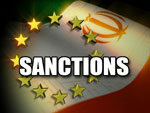 Reuters: Iran has manouevred around sanctions for deacdes, but the task has become more complicated since Western powers introduced new measures in the middle of last year, which specifically targeted oil and gas trade.
Reuters: Iran has manouevred around sanctions for deacdes, but the task has become more complicated since Western powers introduced new measures in the middle of last year, which specifically targeted oil and gas trade.
 March 31 (Reuters) – Iran has manouevred around sanctions for deacdes, but the task has become more complicated since Western powers introduced new measures in the middle of last year, which specifically targeted oil and gas trade.
March 31 (Reuters) – Iran has manouevred around sanctions for deacdes, but the task has become more complicated since Western powers introduced new measures in the middle of last year, which specifically targeted oil and gas trade.
No sanctions, however, are water-tight.
The following is an update of Iran’s response to them.
GASOLINE
Iran is OPEC’s second biggest crude producer after Saudi Arabia, but its inadequate refinery infrastructure made it an importer of gasoline.
After last year’s wave of sanctions scared off many of Iran’s regular suppliers, Iran took measures that it said makes it self-sufficient in gasoline and it has even exported some cargoes.
Analysts and traders have agreed gasoline imports have fallen drastically, but have said some shipments from friendly powers, such as China, Venezuela and Russia, have got through.
Industry sources have said Iran was importing 150,000 tonnes per month, compared 450,000 tonnes before.
A standard cargo is around 33,000 tonnes (280,000 barrels).
Demand has fallen in Iran as subsidies have been reduced, meaning prices for gasoline have increased, but traders said Iran was still not able to import as much as it needed.
CRUDE SALES
Iran has also been selling unrefined oil.
As Italy, which is heavily dependent on imported fuel, stayed loyal, its oil imports from Iran rose by 80.6 percent in 2010, an industry group said earlier this month.
Disruption of Libyan exports because of violent unrest in the OPEC member country also provided an opportunity for Iran to sell some of the crude that had built up in floating storage.
Shipping sources said this week Iran was storing crude oil at sea on 12 very large crude carriers (VLCCs), which can hold a maximum of 24 million barrels.
A further 12 million barrels of crude oil was being held in shorter term storage involving shuttle transits to the Red Sea oil terminal of Sidi Kerir, they said.
That compares with a peak of up to 25 tankers, mostly VLCCs, last year, which was the highest build up of Iranian crude at seas since 2008.
INDIA/IRAN
After Saudi Arabia, Iran is the second biggest oil supplier to India, providing it with around 400,000 barrels per day.
India’s central bank said in December payments to Iran could no longer be settled using a clearing system run by regional central banks.
Early this week, Germany agreed to help India make payments for Iranian oil, a newspaper reported on Monday.
HOW THE SANCTIONS ARE BYPASSED?
The biggest problem for traders is that financial transactions with Iran even for very small amounts require authorisation.
Traders said any company dealing with Iran struggled to obtain letters of credit, needed to guarantee transactions, so cash transfers were easier.
Alternatively, some Asian banks and smaller banks in the Middle East were willing to run the risk of providing guarantees.
Often, Iranian cargoes are shipped in vessels chartered by front companies.
As further possible cover, the final destination is not necessarily that shown on shipping documents.
“It is usually the trading companies who charter the vessel. They tell the ship owner where it will go and once they sail, they can easily change the destination,” one ship broker based in the Gulf said.
Lawyers said they had been approached by trading companies asking how they could continue to trade legally. (Reporting by Humeyra Pamuk and Jonathan Saul)


